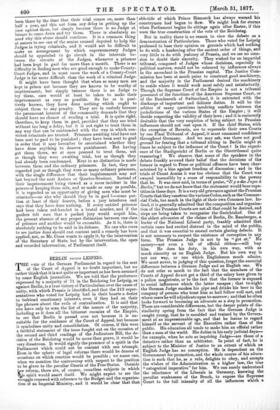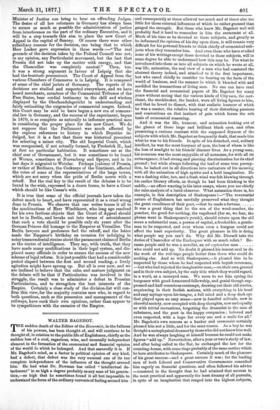BERLIN versus LEIPZIG.
THE vote of the German Parliament in regard to the seat of the Court of Appeal is no doubt important, but we rather think that it is not quite so important as has been assumed by some English journalists. We are told that the preference expressed by a majority of 71 in the Reichstag for Leipzig, as against Berlin, is a true victory of Particularism over the cause of unity, with which Prussia is identified, and that the 213 repre- sentatives who voted for Leipzig had in their hearts a desire to befriend reactionary interests, even if they had on their lips phrases about the evils of centralisation. It is said that you have only to scan the list of the names of the majority, including as it does all the bitterest enemies of the Empire, to see that Berlin is passed over not because it is un- suitable for the residence of the Court of Appeal, but because it symbolises unity and consolidation. Of course, if this were a faithful statement of the issue fought out on the occasion of the second and third readings of the Judicature Bill, the de- cision of the Reichstag would be more than grave, it would be very disastrous. It would signify the presence of a spirit in the Parliament which could not be content with one triumph. Even in the sphere of legal reforms there would be dozens of occasions on which reaction would be possible ; we name one, when we mention the controversy with respect to the position to be given to the peculiar Courts of the Free States. Outside
w reform, there are, of course, countless subjects in which is spirit would assert itself. We might expect to see the struggle renewed with reference to the Budget and the organisa- tion of an Imperial Ministry, and it would be clear that that ebb-tide of which Prince Bismarck has always warned his countrymen had began to flow. We might look for storms when Parliament begins its sittings again after Easter, if this were the true construction of the vote of the Reichstag.
But in reality there is no reason to view the debate as a demonstration of Particularism. Those who voted for Leipzig professed to base their opinion on grounds which had nothing to do with a hankering after the ancient order of things, and very little to do with jealousy of Prussia, and we see no occa- sion to doubt their sincerity. They wished for an impartial tribunal, composed of Judges whose decisions, especially in political matters, would not be coloured by influences always in the ascendant in the Prussian capital. The Justice Com- mission has been at much pains to construct good machinery, and the majority in the Parliament desired the machinery to reside where it would work most safely and satisfactorily.
Though the Supreme Court of the Empire is not a tribunal possessed of the functions of the American Supreme Court, or of the Bundesrath of Switzerland, it is entrusted with the discharge of important and delicate duties. It will be the arbiter of many questions involving conflicts between the jurisdictions of the various States of the Empire ; it will decide respecting the validity of their laws ; and it is eminently desirable that the very suspicion of being subject to Prussian influences should not rest upon it. If the chief States, with the exception of Bavaria, are to supersede their own Courts by one Final Tribunal of Appeal, it must command confidence throughout Germany. And we may ask, was there not good ground for fearing that a tribunal sitting in Berlin might at times be subject to the influence of the Court ? Is the experi- ence of the Stadtgericht of Berlin or the Obertribunal quite reassuring ? We observe that some of the speakers in the debate frankly avowed their belief that the decisions of the former in regard to Press or political offences have been char- acterised by a bias against freedom of discussion ; and in the trials of Count Arnim it was too obvious that the Court was swayed insensibly by a sense of responsibility to the powers
that be. It was once said, in terms of praise, "ll y a des Juges a
Berlin," but we do not know that the statement would bear repe- tition in these days. It is a very old grievance against the Prussian Courts that they construe the various Codes, such as the Commer- cial Code, too mach in the light of their own Common law. In- deed, it is generally admitted that the composition and organisa- tion of the Prussian Courts are not all that could be desired, and steps are being taken to reorganise the Gerichtshof. One of the ablest advocates of the claims of Berlin, Dr. Bamberger, a leader of the National Liberal party, frankly admitted that certain cases had excited distrust in the mind of the public, and that it was essential to amend certain glaring defects. It is not necessary to suspect the existence of corruption in any form. The Prussian Judge is not to be " got at." No money—not even a bit of official ribbon—will buy him. He does his duty, in his own way, with as much sincerity as an English Judge. But his own way is not our way, or one which Englishmen much admire. We must never, in judging of this question, forget the essential difference between a German Judge and an English one. We do not refer so much to the fact that the members of the Courts of Appeal do not get a third of the salary here given to a police magistrate, or to the fact that the former is exposed to social influences which the latter escapes ; that to-night the German Judge smokes his pipe and drinks his beer in the company of persons who treat him as hail fellow well met, and whose cases he will adjudicate upon to-morrow ; and that he often looks forward to becoming an advocate as a step in promotion. These are considerable differences, but the deeper points of dis- similarity spring from the fact that the German Judge is caught young, that he is moulded and trained by the Govern- ment at an impressionable age, and that he learns to regard himself as the servant of the Executive rather than of the public. His education all tends to make him an official rather than a man of the world. His duties in his early judicial days— for example, when he acts as inquiring Judge—are those of a detective rather than an arbitrator. In point of fact, he is subject to the Minister of Justice to an extent of which an English Judge has no conception. He is dependent on the Government for promotion, and the whole course of his educa- tion is such that he, as a rule, delights to obey, and accepts the wishes of the Administration as a higher law, the true " categorical imperative " for him. We can surely understand the reluctance of the Liberals in Germany, knowing the peculiar weaknesses of the Bench, to expose the Supreme Court to the fall intensity of all the influences which a
Minister of Justice can bring to bear on offending Judges. The desire of all law reformers in Germany has always been to secure as much as possible the administration of justice from interference on the part of the ordinary Executive, and it will be a step towards this aim to place the new Court of Appeal in the capital of Saxony. Of course there were other subsidiary reasons for the decision, one being that to which Herr Lasker gave expression in these words :—" The real grounds of the decision taken by the Federal Council was not, in my opinion, any Particularist movement, but the fact that Prussia did not take up the matter with energy, and that the Chancellor was completely neutral." Then, too, it was a strong argument in favour of Leipzig that she had the beatitudo possessionis. The Court of Appeal from the various Chambers of Commerce is in Leipzig. It is composed of some of the chief jurists of Germany. The reports of its decisions are studied and respected everywhere, and we have heard merchants, members of the Commercial Tribunes of the Free States, bear cordial testimony to the skill and wisdom displayed by the Oberhandelsgericht in understanding and fairly estimating the exigencies of commercial usages. Indeed, this Court may be said to have begun a new era of commer- cial law in Germany, and the success of the experiment, begun in 1870, is so complete as naturally to influence practical men in considering the proper place for the new Court. We do not suppose that the Parliament was much affected by the copious references to history in which Deputies in- dulged, but it is a fact that there was historical precedent for selecting a minor city. The old Imperial Court, which was reorganised, if not actually formed, by Frederick II., had at first no particular habitation. It sometimes sat at the chief seat of Government, but it was sometimes to be found at Worms, sometimes at Nuremberg and Speyer, and in its last days it migrated to Wetzlar. Perhaps jealousy of Prussia, or rather of Berliners, the Cockneys of the Continent, affected the votes of some of the representatives of the large towns, which are not sorry when the pride of Berlin meets with a rebuff. But the real key to the result of the debates is to be found in the wish, expressed in a dozen forms, to have a Court which should be like Caesar's wife.
It is true that some of the official journals have taken the defeat much to heart, and have represented it as a cruel wrong done to Prussia. We observe that one writer traces it all to the machinations of Herr Windthorst, who long ago resolved for his own factious objects that the Court of Appeal should not be in Berlin, and breaks out into terms of astonishment that such a vote should be possible only six years after the German Princes did homage to the Emperor at Versailles. The Berlin lawyers and professors feel the rebuff, and the latter made the Emperor's birthday an occasion for indulging in noisy transcendental strains about the paramount claims of Berlin as the 'Centre of intelligence. They say, with troth, that they have made many modifications in their legal system, and dis- placed many officials in order to ensure the success of the new scheme of legal reform. It is just possible that had a considerable period elapsed between the first and second reading, a lively agitation might have sprung up. But all is over now, and we are inclined to believe that the calm and mature judgment on the debate will be that if Particularism was involved in the struggle, the result was to administer a defeat to Prussian Particularism, and to strengthen the best interests of the Empire. Certainly a close study of the division-list will con- firm this view, for the majority contains men who, in regard to both questions, such as the possession and management of the railways, have sunk their own opinions, rather than appear to be sympathisers with the enemies of the Empire.



































 Previous page
Previous page